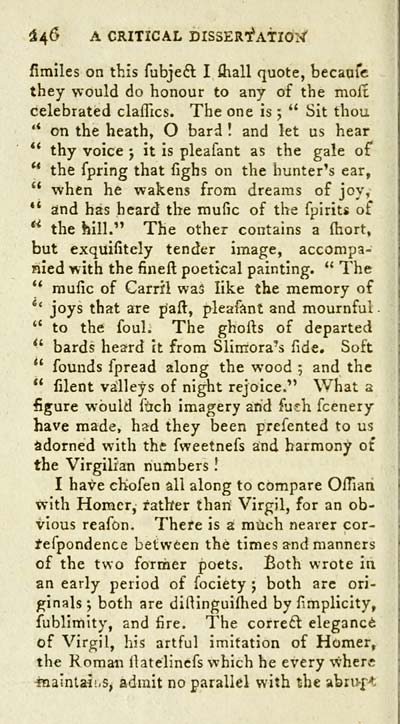Ossian Collection > Poems of Ossian > Volume 3
(254)
Download files
Complete book:
Individual page:
Thumbnail gallery: Grid view | List view

i^6 A CRITICAL DISSERT* ATIOM'
fimiles on this fubjeft I fliall quote, becaufc
they would do honour to any of the moft
celebrated claffics. The one is ; " Sit thou
** on the heath, O bard ! and let us hear
** thy voice j it is pleafant as the gale of
" the fpring that fighs on the hunter's ear,
'* when he wakens from dreams of joy,
** and has heard the mufic of the fpirits of
** the hill." The other contains a (hort,
but exquifitely tender image, accompa-
nied with the fineft poetical painting. " The
** mufic of Carrfl wa5 like the memory of
*' joys that are paft, pleafant and mournful .
*' to the foul. The ghofls of departed
" bards heard it from Slimora's fide. Soft
*' founds fpread along the wood 5 and the
** filent valleys of night rejoice." What a
figure w^buld fach imagery and fu?:h fcenery
have made, had they been prefented to us
adorned with the fweetnefs and harmony ot
the Virgilian numbers !
I have chofen all along to compare Ofliari
with Homer, rather than Virgil, for an ob-
vious reafon. There is a miich nearer cor-
tefpondence between the times and manners
of the two forrher poets. Both wrote in
an early period of fociety j both arc ori-
p^inals •, both are difiinguifhed by fimplicity,
fublimity, and fire. The correal elegance
of Virgil, his artful imitation of Homer,
the Roman llatelincfs which he every where
fna!nlaii,s, admit no parallel with the abruf^.
fimiles on this fubjeft I fliall quote, becaufc
they would do honour to any of the moft
celebrated claffics. The one is ; " Sit thou
** on the heath, O bard ! and let us hear
** thy voice j it is pleafant as the gale of
" the fpring that fighs on the hunter's ear,
'* when he wakens from dreams of joy,
** and has heard the mufic of the fpirits of
** the hill." The other contains a (hort,
but exquifitely tender image, accompa-
nied with the fineft poetical painting. " The
** mufic of Carrfl wa5 like the memory of
*' joys that are paft, pleafant and mournful .
*' to the foul. The ghofls of departed
" bards heard it from Slimora's fide. Soft
*' founds fpread along the wood 5 and the
** filent valleys of night rejoice." What a
figure w^buld fach imagery and fu?:h fcenery
have made, had they been prefented to us
adorned with the fweetnefs and harmony ot
the Virgilian numbers !
I have chofen all along to compare Ofliari
with Homer, rather than Virgil, for an ob-
vious reafon. There is a miich nearer cor-
tefpondence between the times and manners
of the two forrher poets. Both wrote in
an early period of fociety j both arc ori-
p^inals •, both are difiinguifhed by fimplicity,
fublimity, and fire. The correal elegance
of Virgil, his artful imitation of Homer,
the Roman llatelincfs which he every where
fna!nlaii,s, admit no parallel with the abruf^.
Set display mode to: Large image | Transcription
Images and transcriptions on this page, including medium image downloads, may be used under the Creative Commons Attribution 4.0 International Licence unless otherwise stated. ![]()
| Early Gaelic Book Collections > Ossian Collection > Poems of Ossian > Volume 3 > (254) |
|---|
| Permanent URL | https://digital.nls.uk/77527944 |
|---|
| Description | Volume III. |
|---|---|
| Shelfmark | Oss.41 |
| Attribution and copyright: |
|
| Description | London : printed for J. Mundell & Co. Edinburgh; and for J. Mundell, Glasgow, 1796. In 3 volumes. |
|---|---|
| Shelfmark | Oss.39-41 |
| Additional NLS resources: | |
| Description | Selected books from the Ossian Collection of 327 volumes, originally assembled by J. Norman Methven of Perth. Different editions and translations of James MacPherson's epic poem 'Ossian', some with a map of the 'Kingdom of Connor'. Also secondary material relating to Ossianic poetry and the Ossian controversy. |
|---|
| Description | Selected items from five 'Special and Named Printed Collections'. Includes books in Gaelic and other Celtic languages, works about the Gaels, their languages, literature, culture and history. |
|---|

